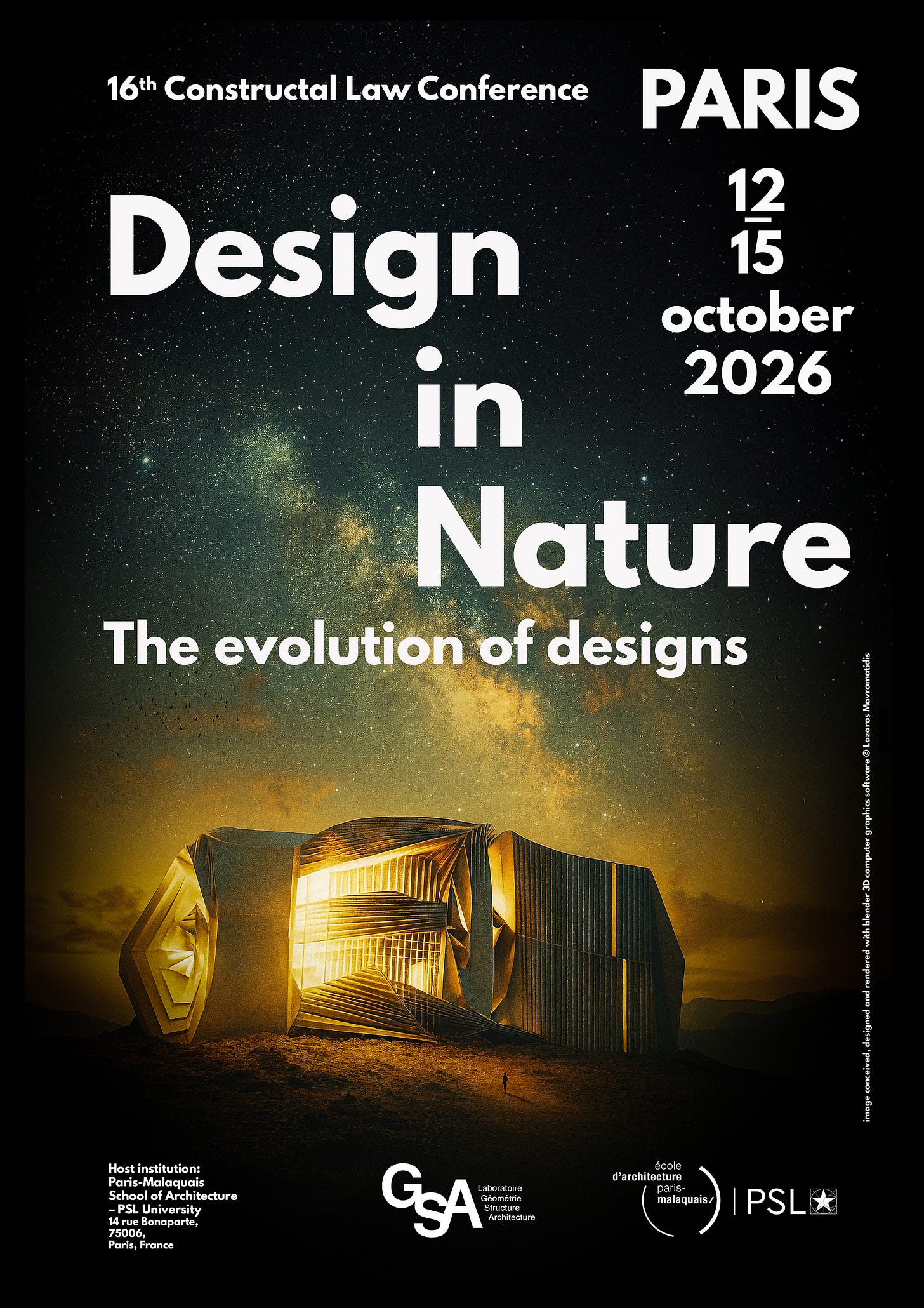In 2026, the constructal community marks a milestone: the 30th anniversary of the Constructal Law—the idea that flow systems (from rivers and lungs to designs, cities, and technologies) evolve to provide easier access to the currents that move through them. Over three decades, this community has grown into a vibrant, transdisciplinary network with more than 7,500 peer-reviewed articles in Q1–Q2 journals across engineering, biology, ecology, geophysics, materials science, computer science, network science, art, architecture, urban planning, economics, and cultural studies.
This anniversary edition of the 16th Constructal Law Conference (CLC2026) — Design in Nature will be hosted for the first time in Paris and, notably, for the first time in a School of Architecture: the Paris-Malaquais School of Architecture – PSL University, in the heart of Saint-Germain-des-Prés. This historic setting—shared with the Beaux-Arts de Paris—has long cultivated experimentation and research. With nearly 90 permanent faculty and 200+ external contributors across six multidisciplinary departments, Paris-Malaquais is uniquely positioned to convene architects, engineers, scientists, and artists who share a common language of flow, form, and evolution.
Since 2025, as a member of PSL (Paris Sciences et Lettres) University—consistently ranked among the world’s top 50—Paris-Malaquais connects participants to one of Europe’s richest academic ecosystems, with shared services, libraries, and a growing network of international partners.
Themes & Tracks
This year’s theme—Design in Nature: The evolution of designs—invites contributions that connect physics, life, culture, philosophy, architecture, urbanism, and the built environment. Tracks include:
The Physics of Life: Flow architectures in living systems, from cells to ecosystems.
Design in Nature: Universal forms in rivers, trees, lungs, turbulence, architectures, and artworks.
Evolutionary Design with Freedom: How systems evolve when free to morph—organisms, environments, cities, technologies, art.
Evolution Across Scales: Geophysical, celestial, biological, social, technological, cultural, and literary flows.
Thermodynamics, Energy, Power, and Economy: Efficiency, entropy, movement, access, and societal structures.
Thermoeconomics, Bioeconomy & Circular Economy: Flow-based models for sustainable futures.
Information, Complexity & the Arrow of Time: Irreversibility, creativity, and cultural memory.
Humans as Part of Nature: Anthropological and artistic perspectives on our place in natural flows.
Hierarchy, Power Laws, Diversity, Inequality & Innovation: Patterns of distribution and creativity across systems.
Living & Non-Living Through the Same Lens: Unified perspectives on animate and inanimate design.
Architecture as Flow Design: Buildings and spatial systems as flow architectures; adaptive structures, ventilation and circulation, tree-shaped structural design.
Urbanism & Tree-Shaped Structures: River basins, transport systems, and cities as natural flow networks; branching and timing logic of streets and infrastructures.
Natural & Social Sciences Together: Transdisciplinary models of evolution and change.
Art & Science Together: Architecture, music, visual arts, literature, and performance as flow systems with staying power.
Predicting Evolution: Forecasting natural, social, technological, and cultural futures.
Why Paris-Malaquais?
Because today’s ecological urgencies and the rise of artificial intelligence demand design freedom grounded in physics and open inquiry. Paris-Malaquais nurtures exactly that: research-driven, dogma-free experimentation—a culture where architects, engineers, scientists, and artists rethink how forms flow and persist.
Join us in Paris to explore how designs in nature—and in culture—evolve to make movement easier, access broader, and life more possible. The world of tomorrow cannot thrive without architects and designers who understand flows—and help make the world a home.



